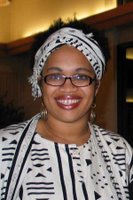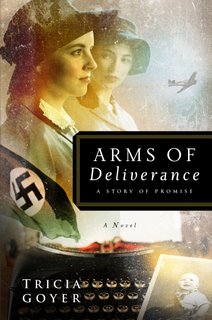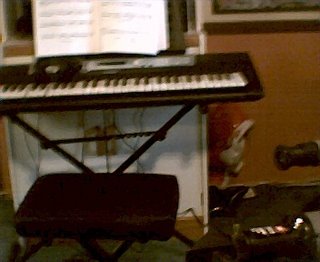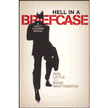
It is February 1st, time for the FIRST Day Blog Tour! (Join our alliance! Click the button!) The FIRST day of every month we will feature an author and their latest book's FIRST chapter!
This month's feature author is:
and his book:
 John was born five miles north of the setting for Abiding Darkness, a cotton country town within a rifle shot of two rivers, a bayou, a double handful of lakes, and endless acres of woods.
John was born five miles north of the setting for Abiding Darkness, a cotton country town within a rifle shot of two rivers, a bayou, a double handful of lakes, and endless acres of woods. After graduating from Mississippi State, he flew six years in the Air Force then twenty-nine years for a major airline. And now he gets to write.
He and his wife have been married for forty some-odd years and live in Texas—about twenty miles south of the Red River. He spends the biggest part of his time writing; she’s immersed in leading a comprehensive, women’s Bible study.
They like greasy hamburgers and Dr. Peppers, most species of warm-blooded creatures (the kind that don’t normally bite), and spending July in the mountains.
 Abiding Darkness is the first book in the Black and White Chronicles.
Abiding Darkness is the first book in the Black and White Chronicles.It initially anchors itself in the relationship between two children.
Junior Washington is an eleven-year-old black child. He lives in a small cabin out on Cat Lake; his parents work for the Parker family. He’s loyal, he’s compliant beyond what would normally be expected of an eleven-year-old boy, and he’s a committed Christian.
Missy Parker, who lives on the other side of the lake, is the crown princess of the Parker family. At seven years of age she’s beautiful, wealthy, willful, and tough as a tractor tire. And—in the midst of the most defined segregation in our nation’s recent history—this little white girl and Junior Washington are best friends.
Only one thing stands between these two children and a storybook childhood . . . they are destined to encounter a faithful servant of the Author of Evil.
Abiding Darkness starts almost gently. The first sentence offers doubt, but readers may not see any real trouble surface until a few sentences later, and that’s mostly kid stuff, almost cute. From there through the second chapter readers are given a little more to think about . . . an opportunity to imagine what might happen to the children . . . especially the girl.
By the end of the second chapter intuitive readers will be taking a deep breath . . . they’re going to need the oxygen.
THE FIRST CHAPTER:
Summers were mostly reliable.
The always followed spring. They always got hot. And they always promised twelve weeks of pleasure to the three children at Cat Lake.
The summer of ’45 lied.
^ ^ ^
The whole thing started right there by the Cat Lake bridge.
They were playing their own version of three-man baseball when Bobby knocked the ball onto the road near the end of the bridge. Junior was taller and faster, but Missy was ahead in the race to get it. Bobby and Junior were older, but Missy was tough enough to almost keep up, and the boys usually held back some so they didn’t outdo her too much.
Missy was still a few yards from the ball when it rolled to a stop near the only car in sight. A boy taller than Junior stepped from behind the far end of the car and picked up the ball; he was followed by two more boys—one younger than Missy and another almost as tall as a man.
Missy slid to a stop in the gravel and yelled, “Hurry! Throw it!” Junior jogged up behind the girl and waited.
A heavyset man in a rumpled suit was standing in the road by the driver’s door; he allowed himself a long look at the girl and whispered something to the boy with the ball.
The boy nodded at what the man said and backed toward the car. The tallest boy moved up to stand by the man.
The fat man eyed Junior, then looked up and down the deserted road before beckoning to Missy. “Why don’t you come closer, and he’ll let you have it?”
Missy ignored the man and advanced on the boy with the ball. “Give it.”
When she walked past the taller boy, he fell to his hands and knees behind her and the one with the ball shoved her over his back. When Missy hit the ground, all three boys laughed. The man grinned.
In the near distance, a foursome of well-armed witnesses—tall, bright, and invisible—stood at a portal between time and eternity and watched Bobby Parker leave home plate and sprint for the bridge.
One of the group said, It begins.
Junior Washington’s guardian answered for the remainder of the small assembly, And so it does.
The three guardians conferred quietly about the events taking place before them; the archangel watched the unfolding drama in silence. The quartet—guarded by the wisdom of the ages against restlessness—waited patiently for a precise instant in time that had been ordained before the earth was formed.
The middle kid was plenty bigger than Missy, but she came off the ground ready to take him on. When she waded in, the tall kid grabbed at her. Junior got a hand on the strap of Missy’s overalls and yanked her out of the boys’ reach. He held her back with one hand and popped the tallest kid in the nose, hard enough to knock him down.
When the boy landed in the gravel, the man started swearing. He reached into the car, jerked a mean-looking billy club from under the front seat, and turned on Junior. “Okay, Black Sambo, let’s see h—”
Bobby was short steps from the trouble, running wide open, when the archangel broke his silence. The long-awaited time is come. He pointed his bright sword at a point between Bobby and the man with the club and said, In the Name of Him who sits on the throne, and for the Lamb—go there and turn the tide of evil.
Bobby—barely slowing when he got to the confrontation—tripped over thin air and rammed the business end of the bat hard into the man’s back. The man lurched forward, stumbled over the boy Junior had knocked to the ground, and sprawled on top of him.
Knocking the man down wasn’t what he’d planned, but Bobby knew better than to back off from a pack of bullies; he was talking before the man rolled over. “You keep your hands to yourself, mister.”
The red-faced man struggled to get up, cussing and pointing the club at Bobby. “Son, when a boy hits me, he steps over the line to manhood. That means you’ll get the same beatin’ I’ll be givin’ this nigger.”
On the Parker place, Negro folks were called black or colored. For the children, transgression of that rule meant someone was going to get his mouth washed out with soap. Missy and Junior froze when the man said the forbidden word; Bobby didn’t.
When Bobby squared his stance and drew the bat back, the man rethought his position. “You better put that down, boy.”
Bobby was only twelve, but he knew serious trouble when he saw it—and he was the one holding the bat. “I reckon not.” He and Junior and Missy had made a law about standing up for each other, and these strangers had chosen to be their enemies. If the man made a threatening move, Bobby was going to swing for his head and deal with the consequences later. “You’re on Parker land, mister, an’ you best be gettin’ off.”
The baseball bat had the man stymied. Exertion and frustration soaked his collar with the sweat. “This isn’t your land; it’s a public road.”
Bobby said, “That might be, but the land on both sides of the road belongs to the Parkers—an’ that’s us.” He looked the man up and down. “You ain’t from around here, are you?”
The man’s wide mouth and thick lips were not unlike those of a bullfrog; small, widely-spaced teeth and flesh-draped eyelids contributed to a reptilian appearance. “What if I’m not?”
Bobby cracked a hard smile. “’Cause if you was from around here, folks would’ve told you not to mess with the Parker kids—that’s us, ’specially the black ’un an’ the girl.” He pointed the bat at Junior and Missy. “That’s them two.”
From within the car a woman’s voice said, “Let it go, Halbert. Don’t be getting heated up over some white trash.”
When the woman called them white trash, Missy puffed up and started for the car. Junior grabbed the strap of her overalls again. “Stay quiet, Missy.”
The girl jerked loose and glared at Junior, but she stayed where she was.
The tallest boy got in the car, holding a hand to his bloody nose. The other two weren’t ready to leave.
The man looked at the car and back at Bobby; he didn’t want to leave either, but he wasn’t going to argue with the woman. “Git in the car, boys.” His tongue came out and made a circuit over the fat lips; he let his gaze rest too long on the girl, and he spoke to her last. “You’ll get yours, Little Miss Blue Eyes. Just you remember Hal Bainbridge said so.”
The woman in the car leaned across the seat. Facial features that had been cast to portray beauty were twisted into an angry mask. “Halbert!” she snapped, “I told you to shut up and get in the car.”
The two smallest boys were the last ones to climb. The one who had pushed Missy said, “I’ll be back.”
Missy made a face.
When the Bainbridge family withdrew, a creature that had been traveling with them stayed behind.
The being that remained on the Cat Lake bridge had been working his vile mischief in the Bainbridges’ lives for years. His brief observation of Missy Parker, however, ignited a hatred that far exceeded anything he had ever felt toward Estelle Bainbridge. He petitioned his leader, the high-ranking villain who was assigned to the Bainbridges, to let him stay at Cat Lake and work his evil on the girl and those around her. The one to whom he answered hated to grant any request that might strengthen the position of a subordinate, but he hated humans more. So it was that the malevolent being stayed behind while his former superior and dozens of their kind moved away with the Bainbridges.
The spirit-being assayed his intended victim and was encouraged by what he saw. The girl was self-willed, self-centered, and self-confident—all traits that made her more susceptible to his influence. Early pieces of his plan were arranging themselves before the Bainbridges’ car was out of sight. He would recruit his own team of underlings from the demonic realm. When he and his chosen confederates were in place, he would formulate a plan to destroy the girl’s life, maybe in bits and pieces over the coming years, maybe catastrophically in a single day. There might even be a way to use the Bainbridges to help bring her to ruin. And, if the opportunity presented itself, he would do the same to the two meddlesome boys.
When the car was down the road, Bobby turned on Missy. “You can’t be startin’ fights with boys bigger’n you.”
“I didn’t start it. He did.”
Bobby watched the car. “Well, don’t be messin’ with folks like that. That man had somethin’ wrong with him, like he was mean or evil or somethin’.”
“I ain’t scared of the boogeyman.”
“I don’t mean like that. I mean grown men who stare at little girls like that—stay away from ’em.” He watched the car disappear behind a curtain of dust. “An’ if that bunch comes around here again, you head for me or Junior, you hear me?”
The girl directed her wrath at her brother. “You’re not my boss, Mr. Bobby Parker, an’ I’ll have you know I ain’t a little girl.”
Bobby was still learning that he needed to tell Missy to do exactly the opposite of what he wanted done, but he knew who carried the most influence over her. “Tell ’er, Junior.”
Junior picked up the ball and offered it to the girl. “Do like he says, Missy. A growed man that’d speak bad to a lit—to somebody not big as him has got somethin’ wrong inside ’im. That man had the devil in ’im.”
She turned her back on the ball because she wouldn’t be bribed. “Well, if a’ evil man shows up again, an’ I can’t whip ’im by myself, y’all can help.”
The boys took that as a concession and followed her back to their baseball field.
^ ^ ^
Amanda Allen Parker was the first girl born into the Parker family since the Surrender. Maybe they had spoiled her or maybe she knew she was special. Whatever the cause, “Missy” Parker was a young lady who didn’t just give orders—she laid down the law for those who drew near.
When they didn’t call her Missy, everybody on the Parker place and most people in town just referred to her as the girl. The petite picture of brown-haired Southern charm endured the company of women when she had to, but she preferred the attention of the males of her domain.
The Old Parkers and the Young Parkers lived out south of town in two nice houses set back from the west side of Cat Lake. They got good shade from a stand of oaks planted by their ancestors and the cool of a lake breeze when the wind was right.
Bobby Lee Parker ran the Parker Gin; young Bobby looked as if he had been spit out of his daddy’s mouth. Young Mrs. Parker played bridge, went to the garden club and Missionary Society, and tended her yard. Old Mr. Parker farmed ten sections of cotton land, played dominoes, drank coffee, and visited with his friends. Old Mrs. Parker, the genetic source of the girl’s spitfire personality, stayed close to home and baked things.
The Washington family—Mose, his wife Pip, Mose Junior, and little Pearl—lived across the lake from the Parkers. Their home was set back in a stand of pecan trees planted by the same hands that put down the Parkers’ oaks. Mose had been born in the cabin and inherited the house and forty acres of good sandy land from Pap, his great-granddaddy. Back behind the cabin, a full section of Old Mr. Parker’s cotton land separated Mose’s place from the trees of Eagle Nest Brake. Pip, her brother Leon, and her momma Evalina “did for” the Parkers during the week. Mose was Mr. Bobby Lee’s overseer at the gin.
When she became old enough to walk, the girl went where Old Mr. Parker went. While he drove, she stood beside him, one arm on his shoulders, the other holding on to the seat back. When he played dominoes at the pool hall, she sat on his lap. It was the men at the pool hall who had named her Missy—she and those same men called her granddaddy R. D. Trips to that establishment dimished in frequency after Pip had to switch her for “cussin’ in my kitchen.”
Once she started to Mrs. Smith’s kindergarten, Missy’s day-to-day activities became even more curtailed. She countered by playing hooky when she’d had her fill of finger painting and stories about animals made of gingham and calico and velveteen.
After the second time she got called away from her Thursday morning bridge game to hunt for the girl, Young Mrs. Parker taught Pip how to drive. For the next two years, Pip was called into town about twice a week to retrieve the girl from the pool hall. When she was captured, Missy’s complaints were drawled in a little-girl bass voice.
On her first day in first grade, the girl and the staff at the elementary school encountered the first in a series of unique obstacles. The magnitude of the initial confrontation was probably connected with the fact that Missy was on a first-name basis with most of the men in Moores Point, including both bankers and both white preachers.
Missy finally came out of her chair when the first-grade teacher persisted in calling her Amanda.
Hoot Johnson, the school’s janitor, attracted by the mounting sounds of battle, abandoned his dust mop and intervened to contribute his unsolicited—and uninhibited—opinion. The girl’s reaction to what Mr. Johnson had to say didn’t help the situation.
The teacher made a strategic blunder when she decided she would enlist the aid of the principal. The principal made the mistake of showing up, and the tension multiplied geometrically.
Someone eventually called the pool hall and let Old Mr. Parker know about the conflict.
When he got to the school, the farmer didn’t have to guess where the girl was; the war in Europe could not have been heard over the commotion coming from the first-grade classroom.
The adults in the room—a scattering of teachers, the principal, and one vocal janitor—were all yelling at the girl or each other. The other first-day first-graders—joined by two brand-new teachers who had made the mistake of coming to see what on earth the noise was all about—were all cringing in the farthest corner of the room. The girl, who seldom found it necessary to yell at anyone, especially an adult, was keeping her voice down. She was, however, employing the teacher’s chair to be at eye level with the other combatants.
There was Missy, standing in the chair, her tiny fists at her waist, leaning into the principal’s face, her Dutch boy-cut brown hair popping back and forth as her miniature bass voice cataloged the things she didn’t like about his institution. She took passing note of her granddaddy’s presence but continued with her business. She reasoned that if R. D. needed to talk to some of these folks, he was gentleman enough to wait his turn; if he needed to see her, he’d wait ’til she was finished. And wait he did. Leaning on the door frame and giving himself a manicure with his favorite Case pocketknife, the cotton farmer stood by for a break in the storm.
When a majority of the folks finally stopped to catch their breath, Old Mr. Parker put away his knife. He got everyone settled down, borrowed the teacher’s chair from the girl, and presided over the formation of a multifaceted truce.
In the future, the school’s staff would call the girl Missy; she was old enough to decide what her name was. In return, Missy would address the Truitt Elementary School’s principal as Mr. Franklin, not Jimbo, for basically the same reason. Missy would address Mr. Johnson, the school’s janitor, as Hoot because he and the girl were good friends and both preferred it that way. And, one of the teachers crouching in the corner would be released from her contract before the girl moved up to her grade level.
The last point of the truce was a little vague and never resolved to the girl’s satisfaction. It had something to do with whether she could stand on the teacher’s chair, balanced against how many adults were “raisin’ sand for no good reason” when the girl needed to make herself heard.
In the pool hall that afternoon Jimbo Franklin said, “You know somethin’? That girl ain’t always pliable, but she’s almost always fair. I musta been about a bubble offa plumb to take that teacher’s side.” The sages in the pool hall, including Hoot and R. D., nodded. They agreed with every word he said.
During the next year, the second grade had tolerated her well enough; the reciprocal wasn’t always true.
She was three feet tall in the summer of ’45, on the slender side of a pound an inch, with what Scooter Hall called “about eight ounces of eyelashes” strategically situated around midnight blue eyes.
When the sun was out, the three older children at the lake—two Parkers and one Washington—were inseparable. Junior usually deferred to white folks of all ages, and both boys required themselves to yield to most adults. The girl’s deference, however, was never offered capriciously; people of all colors and ages were evaluated on a case-by-case basis, and any recipient of her respect had earned it.
For those times when they stepped away from the rest of the world, the children—like a tiny nation—followed an often-argued tangle of laws they had fashioned for themselves.
For three months every summer, and at any other time the children were together, their respective parents—who never knew what might be coming next—waited for the “other shoe to drop.” Or as Old Mr. Parker put it, “for the next shoe to crash through the floor and take most of the house with it.”
^ ^ ^
That spring, the three had used up practically a whole Saturday morning arguing about what to name the boat.
The year before, they had procured the building materials for the vessel by tearing the siding off a dilapidated cotton house. Pip’s brother Leon, who took care of things around the Parkers’ houses, was perfectly content to cater to the girl’s every whim. Missy traded him two of Old Mr. Parker’s cigars for his help with the boat. Leon sawed the boards, helped the children nail them together into something that would almost float, and showed them how to put tar in the cracks “so it don’t leak too bad.” The finished product looked like a pauper’s coffin: roughly seven feet long, two feet wide, with two-foot sides. They swamped it so often the first month that Pip told them, “Y’all could use it for one o’ those summarines.” Missy made a new law that only one person could stand up in it at a time, and they kept slopping on tar until they got so they could stay most of the day on the lake without sinking, unless somebody broke the rule. Pip complained, “When they git outta that confounded piece o’ junk, they’re so black I can’t tell which one’s Mose Junior.” It wasn’t the kind of craft a person would want to venture out in while wearing Sunday clothes.
The argument about the christening surfaced because Bobby wanted to name the boat after his hero. Mose Junior said he thought it might be good to name it something out of the Bible, but he cared more about getting started with the painting. When it came right down to it, Missy didn’t really care what they named the dadgummed boat; she was just tired of Bobby getting his way just because he was twelve and she was seven. Bobby countered her objections by claiming they were a democracy, then bought Mose Junior’s vote with the promise that Junior could do most of the painting.
They “happened across” a can of white house paint on the top shelf of the tool shed and made a paint brush by tying a wad of pine needles together. Unraveling the boat’s actual name called for the reader to do a little traveling. The lettering was white and bold; the spelling was close. Junior’s GENRALROB worked its way down the starboard side; around the corner, the bow showed Bobby’s neatly done ERT. The arrangement of the general’s middle initial and last name on the port side was Missy’s responsibility—they came out EEEL. The craft was one of their greatest accomplishments, and they were rarely near the water without it.
Young Mrs. Parker took some snapshots of the paint-splattered trio standing by their pride and joy and gave one to Pip. The two mothers kept the cherished photographs on their dressers until the day they died and occasionally laughed together at speculations of what kind of grandchildren they would see from the mischievous threesome.
They had no way of knowing that the three little figures in the picture were never going to have children.











